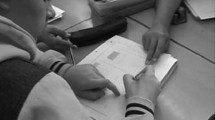Abstract
In this article, the author examines the character of the conversations generated in an elementary teacher group as they worked on mathematical problems together and analyzed their students' work. Two distinct forms of talk — exploratory and expository — were found. The first type of talk occurred most prominently when discussions centered on the teachers' own mathematical work and the second type when conversations centered on that of their students. By examining closely the few occasions when the groups' expository talk turned exploratory, the author explores how both the nature of the tasks and the range and type of facilitator conversational strategies can play significant roles in promoting and interrupting these conversational patterns to educational ends.
Similar content being viewed by others
References
Arbaugh, F.: 2003, ‘Study groups as a form of professional development for secondary mathematics teachers’, Journal of Mathematics Teacher Education 6, 139–163.
Barnes, D.: 1976, 2nd ed. 1992. From Curriculum to Communication, Portsmouth, NH: Boynton/Cook-Heinemann.
Britton, E., Paine, L., Pimm, D. and Raizen, S.: 2003, Comprehensive Teacher Induction: Systems for Early Career Learning, Kluwer Academic Publishers, Dordrecht.
Burns, M.: 1992, About Teaching Mathematics: A K-8 resource, Sausalito, CA: Math Solutions Publications.
Cazden, C.: 1988, Classroom Discourse: The language of teaching and learning, Heinemann, Portsmouth, NH.
Chapman, A.: 2003, Learning Practices in School Mathematics: A Social Semiotic Approach, Edwin Mellen Press, Lewiston, NY.
Crespo, S.: 2002a, Doing Mathematics and Analyzing Student Work: Problem-Solving Discourse as a Professional Learning Experience. Paper presented at the Annual Meeting of the American Educational Research Association. New Orleans.
Crespo, S.: 2002b, ‘Teacher learning in mathematics teacher study groups’, in D. Mewborn, et al. (eds.), Proceedings of the 24th PME-NA Annual Conference, vol. 3, Columbus, OH, ERIC Publications, pp. 1439–1450.
Crespo, S. and Featherstone, H.: 2001, 2002, 2003, Communities of Practice to Improve Mathematics and Mathematics Teaching: Years 1–3. Technical Reports to the Lucent Technologies Foundation. East Lansing, Michigan State University.
Grossman, P., Wineburg, S. and Woolworth, S.: 2001, ‘Toward a theory of teacher community’, Teachers College Record 103, 942–1012.
Kazemi, E. and Franke, M.: 2004, ‘Teacher learning in mathematics: Using student work to promote collective inquiry’, Journal of Mathematics Teacher Education 7, 203–235.
Klein, V. and Jackson, K.: 2003, The Relationship Between a Novice Teacher's Participation in a Teacher Study Group and her Beliefs and Practices. Presentation at the NCTM Research Pre-session. Las Vegas.
Lampert, M.: 2001, Teaching Problems and the Problems of Teaching, Yale University Press, New Haven.
Lortie, D.: 1975, Schoolteacher: A Sociological Study, University of Chicago Press, Chicago.
McLaughlin, M. and Talbert, J.: 2001, Professional Communities and the Work of High School Teaching, University of Chicago Press, Chicago.
National Council of Teachers of Mathematics (NCTM): 1991, Professional Standards forTteaching Mathematics, National Council of Teachers of Mathematics, Reston, VA.
National Council of Teachers of Mathematics (NCTM): 2000, Principles and Standards for School Mathematics, National Council of Teachers of Mathematics, Reston, VA.
Pfeiffer, L. and Featherstone, H.: 1995, Toto I Don't Think We're in Kansas Anymore: Entering the Land of Public Disagreements in Learning to Teach, Michigan State University, Unpublished manuscript.
Putnam, R. and Borko, H.: 2000, ‘What do new views and knowledge and thinking have to say about research on teacher learning?’, Educational Researcher 29(1), 4–15.
Simon, M.: 1994, ‘Learning mathematics and learning to teach mathematics: Learning cycles in mathematics teacher education’, Educational Studies in Mathematics 26, 71–94.
Stigler, J.W. and Hiebert, J.: 1999, The Teaching Gap: Best Ideas from the World's Teachers for Improving Education in the Classroom, Free Press, New York, NY.
Streefland, L.: 1978, ‘Some observational results concerning the mental constitution of the concept of fraction’, Educational Studies in Mathematics 9, 51–73.
Tannen, D.: 1989, Talking Voices: Repetition, Dialogue, and Imagery in Conversational Discourse, Cambridge University Press, New York, NY.
Walkerdine, V.: 1988, The Mastery of Reason: Cognitive Development and the Production of Rationality, Routledge, New York, NY.
Wenger, E.: 1998, Communities of Practice: Learning, Meaning, and Identity, Cambridge University Press, Cambridge.
White, D., Sztajn, P., Hackenberg, A. and Snider, M.A. 2004, ‘Building a mathematics education community that facilitates teacher sharing in an urban elementary school’, in D. McDougall and J. Ross (eds.), Proceedings of the 26th PME-NA Annual Conference, Toronto, ON, OISE/UT, vol. 3, pp. 977–983.
Wilson, S. and Berne, J.: 1999, ‘Teacher learning and acquisition of professional knowledge: An examination of contemporary professional development’, in A. Iran-Nejad and D. Pearson (eds.), Review of Research in Education, American Educational Research Association, Washington, DC, pp. 173–209.
Author information
Authors and Affiliations
Rights and permissions
About this article
Cite this article
Crespo, S. Elementary Teacher Talk in Mathematics Study Groups. Educ Stud Math 63, 29–56 (2006). https://doi.org/10.1007/s10649-005-9006-0
Received:
Accepted:
Published:
Issue Date:
DOI: https://doi.org/10.1007/s10649-005-9006-0




